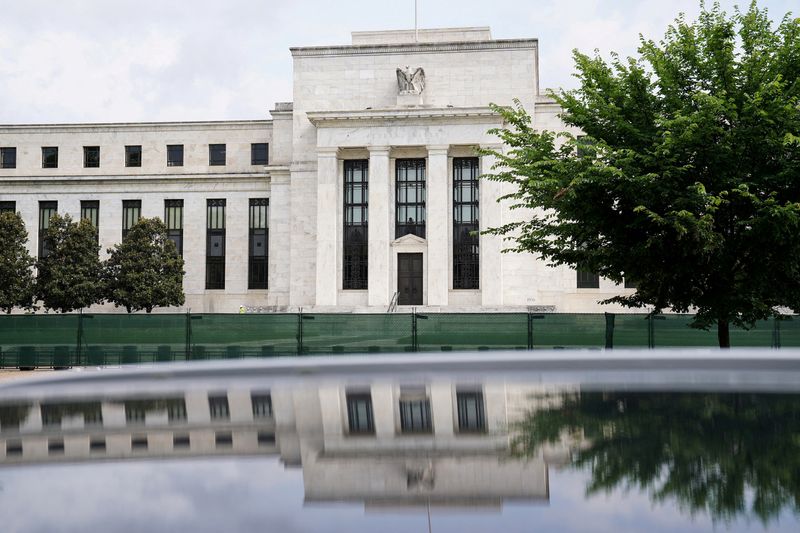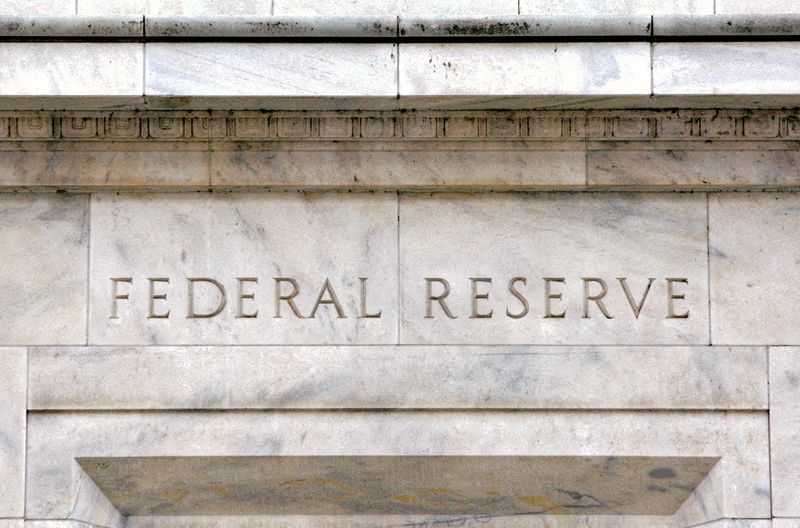By Davide Barbuscia and David Randall
NEW YORK (Reuters) - The Federal Reserve’s plans for a prolonged period of elevated interest rates could continue pressuring stocks and bonds in coming months, though some investors doubt the central bank will stick to its guns.
The U.S. central bank left interest rates unchanged on Wednesday, in line with market expectations. But policymakers bolstered their hawkish stance with a further rate increase projected by the end of the year and monetary policy forecasts kept significantly tighter through 2024 than previously expected.
Broadly speaking, higher rates for longer could be an unwelcome turn of events for stocks and bonds. The benchmark U.S. Treasury yield, which moves inversely to bond prices, already stands at its highest since 2007 after surging in recent months, and could continue climbing if rates remained high.
Elevated yields on Treasuries - seen as a risk-free alternative to equities because they are backed by the U.S. government - are also a headwind to stocks. The S&P 500 is up 15% year-to-date but has struggled to advance from late July’s high as the surge in yields accelerated.
The S&P 500 lost 0.94% on Wednesday, while the yield on two-year Treasuries, which reflect interest rate expectations, hit 17-year highs.
"There’s now a wider range of potential outcomes for when rate cuts are going to come, and that sets up the potential for increased volatility as we head into year end," said Josh Jamner, investment strategy analyst at Clearbridge Investments.
Still, it appeared that at least some part of the market was doubtful the Fed would stand firm on keeping rates as high as it projected - even though betting against the U.S. central bank’s hawkishness has mostly been a losing wager since policymakers began raising borrowing costs in March 2022.
Futures tied to the Fed’s policy rate late Wednesday showed traders were betting the central bank would ease monetary policy by a total of nearly 60 basis points next year, bringing interest rates to about 4.8%. That compares to the 5.1% the Fed penciled into its updated quarterly projections.
"It looks as though the Fed is trying to send as hawkish a signal as it possibly can. It's just a question of whether the markets will listen to them," said Gennadiy Goldberg, head of U.S. rates strategy at TD Securities USA. “If the economy starts to soften, I don't think these dot-plot projections will actually hold up.”
HOW RESILIENT?
The key question, many investors believe, is to what degree the 525 basis points in rate hikes the Fed has delivered since March 2022 to battle inflation have filtered through the economy, and whether U.S. growth will hold up if rates stay around current levels for most of 2024.
Fed Chair Jerome Powell said a "solid" economy would allow the central bank to keep additional pressure on financial conditions with much less of a cost to growth and the labor market than in previous U.S. inflation battles.
Still, investors are contending with a series of near-term risks that have chipped away at the view of an economic “soft landing,” where the Fed is able to gradually ease inflation without causing a recession.
These include higher energy prices, an auto workers strike launched last week, the possibility of a government shutdown, and an end to the moratorium on student loan repayments. Signs of wobbling growth could bolster the case for the central bank to cut rates far sooner than it had projected.
"Inflation is going in the right direction, but … there's a lot of headwinds" to growth, said David Norris, head of U.S. credit at TwentyFour Asset Management.
John Madziyire, senior portfolio manager and head of U.S. Treasuries and TIPS at Vanguard Fixed Income Group, believes bond yields are near their peak and look “super attractive”.
“I don’t think there’s much room for yields to go higher, so as a long-term investor … you should be adding more duration risk at these levels and use any selloff to actually add duration risk,” he said.
Of course, betting on a rate peak has backfired on investors several times in the past year, as stronger-than-expected economic growth forced markets to recalibrate views for a 2023 recession and push back expectations for how soon the central bank would cut borrowing costs.

But for Norris, of TwentyFour Asset Management, the longer rates stay high, the greater the chance that a soft landing narrative doesn't play out.
"If they keep monetary policy as restrictive as it is … the chances of a harder landing become higher," he said.
